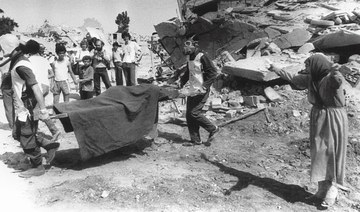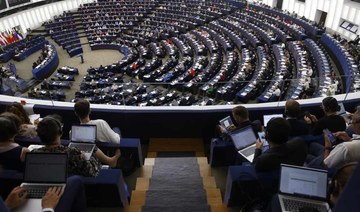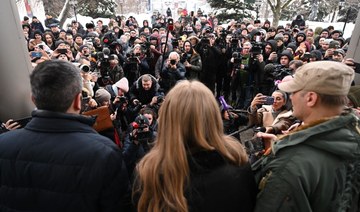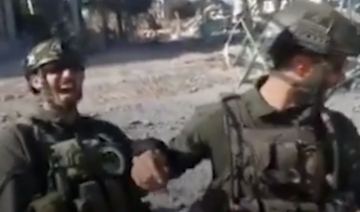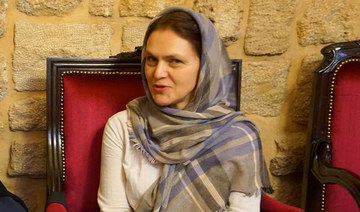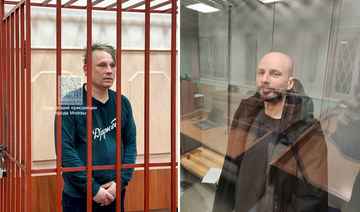BEIRUT: Veteran British journalist Robert Fisk, one of the best-known Middle East correspondents who spent his career reporting from the troubled region and won accolades for challenging mainstream narratives has died after a short illness, his employer said Monday. He was 74.
Fisk, whose reporting often sparked controversy, died Sunday at a hospital in Dublin, shortly after he was taken there after falling ill at his home in the Irish capital. The London Independent, where he had worked since 1989, described him as the most celebrated journalist of his era.
“Fearless, uncompromising, determined and utterly committed to uncovering the truth and reality at all costs, Robert Fisk was the greatest journalist of his generation,” said Christian Broughton, managing director of the newspaper.
“The fire he lit at The Independent will burn on,” he said.
Born in Kent, in the United Kingdom, Fisk began his career on Fleet Street at the Sunday Express. He went on to work for The Times, where he was based in Northern Ireland, Portugal and the Middle East. He moved to Beirut in 1976, a year after the country’s civil war broke out, and continued to work and live from an apartment located on the Lebanese capital’s famed Mediterranean corniche until his death.
From his base in Beirut, Fisk traveled across the Mideast and beyond, covering almost every big story in the region, including the Lebanon war, the Iran-Iraq war, the Arab-Israeli conflict, the war in Algeria, the conflict in Afghanistan, Saddam Hussein’s invasion of Kuwait, the US invasion and occupation of Iraq, the Arab Spring and Syria’s civil war. His reporting earned him awards, but also invited controversy, particularly his coverage of the Syria conflict.
A fearless, bespectacled and cheerful personality bristling with energy, Fisk was often the first reporter to arrive at the scene of a story. He shunned email, smart phones and social media till the end, and strongly believed in the power of street reporting.
In 1982, he was one of the first journalists at the Sabra and Shatila camp in Beirut, where Christian militiamen slaughtered hundreds of Palestinian refugees. Earlier that year, he was also the first foreign journalist to report on the scale of the Hama massacre in 1982, when then-Syrian President Hafez Assad launched a withering assault on the rebellious city in central Syria, leveling entire neighborhoods and killing thousands in one of the most notorious massacres in the modern Middle East.
Fisk was in love with Beirut, the city he called home, sticking with it during the most difficult days of the 1975-90 civil war when foreign journalists fell victim to kidnappers. Back then, he used the offices of The Associated Press to file his stories during the war, where colleagues called him “the Fisk,” or “Fisky.”
In his book chronicling the war, Pity the Nation, he describes filing his dispatches by furiously punching a telex tape at the bureau, which he described as “a place of dirty white walls and heavy battleship-grey metal desks with glass tops and iron typewriters” and a “massive, evil-tempered generator” on the balcony.
“So sad to lose a true friend and a great journalist. The Temple of truth is gone,” said Marwan Chukri, director of the Foreign Press Center at the Information Ministry in Beirut.
Fisk gained particular fame and popularity in the region for his opposition to the Iraq war, challenging the official US government narrative of weapons of mass destruction as it laid the groundwork for the 2003 invasion.
He was one of the few journalists who interviewed Osama bin Laden several times. After the Sept. 11, 2011 attacks and the subsequent US invasion of Iraq, he traveled to the Pakistan-Afghan border, where he was attacked by a group of Afghan refugees.
He later wrote about the incident from the refugees’ perspective, describing his beating by refugees as a “symbol of the hatred and fury of this filthy war.”
“I realized – there were all the Afghan men and boys who had attacked me who should never have done so but whose brutality was entirely the product of others, of us — of we who had armed their struggle against the Russians and ignored their pain and laughed at their civil war,” he wrote.
His most controversial reporting, however, was on the conflict in Syria in the past decade. Fisk, who was often allowed access to government-held areas when other journalists were banished, was accused of siding with the government of President Bashar Assad and whitewashing crimes committed by Syrian security forces, most famously when he cast doubt on whether the government carried out chemical attacks against civilians in the Damascus suburb of Douma.
His deep attachment to Lebanon and its people consistently came through his writing. Following the massive explosion that tore through Beirut port on Aug. 4 and destroyed large parts of the city, he wrote a scathing article that summed up the country’s curse and corrupt political class.
“So here is one of the most educated nations in the region with the most talented and courageous — and generous and kindliest — of peoples, blessed by snows and mountains and Roman ruins and the finest food and the greatest intellect and a history of millennia. And yet it cannot run its currency, supply its electric power, cure its sick or protect its people,” Fisk wrote.
Fisk wrote several books, including “Pity the Nation: Lebanon at War” and “The Great War for Civilization: The Conquest of the Middle East.”
He is survived by his wife, Nelofer Pazira, a filmmaker and human rights activist.
Robert Fisk, veteran foreign correspondent, dies at 74
https://arab.news/mv8qf
Robert Fisk, veteran foreign correspondent, dies at 74

- A fearless, bespectacled and cheerful personality bristling with energy, Fisk was often the first reporter to arrive at the scene of a story
- He shunned email, smart phones and social media till the end, and strongly believed in the power of street reporting
EU bans 4 more Russian media outlets from broadcasting in the bloc, citing disinformation

- The EU has already suspended Russia Today and Sputnik among several other outlets since February 2022
BRUSSELS: The European Union on Friday banned four more Russian media outlets from broadcasting in the 27-nation bloc for what it calls the spread of propaganda about the invasion of Ukraine and disinformation as the EU heads into parliamentary elections in three weeks.
The latest batch of broadcasters consists of Voice of Europe, RIA Novosti, Izvestia and Rossiyskaya Gazeta, which the EU claims are all under control of the Kremlin. It said in a statement that the four are in particular targeting “European political parties, especially during election periods.”
Belgium already last month opened an investigation into suspected Russian interference in June’s Europe-wide elections, saying its country’s intelligence service has confirmed the existence of a network trying to undermine support for Ukraine.
The Czech government has imposed sanctions on a number of people after a pro-Russian influence operation was uncovered there. They are alleged to have approached members of the European Parliament and offered them money to promote Russian propaganda.
Since the war started in February 2022, the EU has already suspended Russia Today and Sputnik among several other outlets.
Israeli soldiers post abusive videos despite army’s pledge to act: BBC analysis

- The BBC analyzed 45 photos and videos posted online by Israeli soldiers that showed Palestinian prisoners in the West Bank being abused and humiliated
LONDON: Israeli soldiers continue to post videos of abuse against Palestinian detainees despite a military pledge to take action against the perpetrators, analysis by the BBC has found.
The broadcaster said it had analyzed 45 photos and videos posted online by Israeli soldiers that showed Palestinian prisoners in the West Bank being abused and humiliated. Some were draped in Israeli flags.
Experts say the footage and images, which showed Palestinians being stripped, beaten and blindfolded, could breach international law and amount to a war crime.
The Israel Defense Forces said some soldiers had been disciplined or suspended for “unacceptable behavior” but did not comment on the individual cases identified by the BBC.
The most recent investigation into social media misconduct by Israeli soldiers follows a previous inquiry in which BBC Verify confirmed Israeli soldiers had filmed Gazan detainees while beating them and then posted the material on social platforms.
The Israeli military has carried out arbitrary arrests across Gaza and the West Bank, including East Jerusalem, since the Hamas attack on Oct. 7. The number of Palestinian prisoners in the West Bank has since risen to more than 7,060 according to the Commission of Detainees’ Affairs and the Palestinian Prisoner Society.
Ori Givati, spokesperson for Breaking the Silence, a non-governmental organization for Israeli veterans working to expose wrongdoing in the IDF, told the BBC he was “far from shocked” to hear the misconduct was ongoing.
Blaming “current far-right political rhetoric in the country” for further encouraging the abuse, he added: “There are no repercussions. They [Israeli soldiers] get encouraged and supported by the highest ministers of the government.”
He said this played into a mindset already subscribed to by the military: “The culture in the military, when it comes to Palestinians, is that they are only targets. They are not human beings. This is how the military teaches you to behave.”
The BBC’s analysis found that the videos and photos it examined were posted by 11 soldiers of the Kfir Brigade, the largest infantry brigade in the IDF. None of them hid their identity.
The IDF did not respond when the BBC asked about the actions of the individual soldiers and whether they had been disciplined.
The BBC also attempted to contact the soldiers on social media. The organization was blocked by one, while none of the others responded.
Mark Ellis, executive director of the International Bar Association, urged an investigation into the incidents shown in the footage and called for the IDF to discipline those involved.
In response to the BBC’s investigation, the IDF said: “The IDF holds its soldiers to a professional standard … and investigates when behavior is not in line with the IDF’s values. In the event of unacceptable behavior, soldiers were disciplined and even suspended from reserve duty.
“Additionally, soldiers are instructed to avoid uploading footage of operational activities to social media networks.”
However, it did not acknowledge its pledge to act on BBC Verify’s earlier findings in Gaza, according to the broadcaster.
4 journalists killed in Gaza as death toll climbs above 100

- 104 Palestinian media workers reported dead, along with 3 Lebanese and 2 Israelis
LONDON: The Gaza Media Authority on Thursday said that four journalists had been killed in an Israeli airstrike, bringing the total number of journalists killed in the conflict to more than 100.
The victims were identified as Hail Al-Najjar, a video editor at the Al-Aqsa Media Network; Mahmoud Jahjouh, a photojournalist at the Palestine Post website; Moath Mustafa Al-Ghefari, a photojournalist at the Kanaan Land website and Palestinian Media Foundation; and Amina Mahmoud Hameed, a program presenter and editor at several media outlets, according to the Anadolu Agency.
The Gaza Media Office said the four were killed in an Israeli airstrike, but did not provide additional details on the circumstances surrounding their deaths.
A total of 104 Palestinian journalists have been killed since the conflict began on Oct. 7. Two Israeli and three Lebanese media workers also have been killed.
The latest loss adds to the already heavy toll on media workers, with the Committee to Protect Journalists saying the Gaza conflict is the deadliest for journalists and media workers since it began keeping records.
Israel is continuing its offensive on Gaza despite a UN Security Council resolution demanding an immediate ceasefire.
On Thursday, South Africa, which has brought a case accusing Israel of genocide to the International Court of Justice, urged the court to order Israel to halt its assault on Rafah.
According to Gaza medical authorities, more than 35,200 Palestinians have been killed, mostly women and children, and over 79,200 have been injured since early October when Israel launched its offensive following an attack by Hamas.
Russia outlaws SOTA opposition news outlet

- Authorities said outlet tries to destabilize the socio-political situation in Russia
- Move could criminalize SOTA content and puts its reporters at risk of arrest
LONDON: Russia declared opposition media outlet SOTA “undesirable” on Thursday, a move that could criminalize the sharing of its content and put its reporters at risk of arrest.
Authorities in Russia have declared dozens of news outlets, think tanks and non-profit organizations “undesirable” since 2015, a label rights groups say is designed to deter dissent.
In a statement, Russia’s Prosecutor General accused SOTA of “frank attempts to destabilize the socio-political situation in Russia” and “create tension and irritation in society.”
“Such activities, obviously encouraged by so-called Western inspirers, have the goal of undermining the spiritual and moral foundations of Russian society,” it said.
It also accused SOTA of co-operating with TV Rain and The Insider, two other independent Russian-language outlets based outside of the country that are linked to the opposition.
SOTA Project, which covers opposition protests and has been fiercely critical of the Kremlin, denied it had anything to do with TV Rain and The Insider and rejected the claims.
But it advised its followers in Russia to “remove reposts and links” to its materials to avoid the risk of prosecution. SOTA’s Telegram channel has around 137,000 subscribers.
“Law enforcement and courts consider publishing online to be a continuing offense. This means that you can be prosecuted for reposts from 2023, 2022, 2021,” it said.
SOTA Project was born out of a split with a separate news outlet called SOTAvision, which still covers the opposition but distanced itself from the prosecutors’ ruling on Thursday.
Since launching its offensive in Ukraine, Moscow has waged an unprecedented crackdown on dissent that rights groups have likened to Soviet-era mass repression.
Among other organizations labelled as “undesirable” in Russia are the World Wildlife Fund, Greenpeace, Transparency International and Radio Free Europe/Radio Liberty.
OpenAI strikes deal to bring Reddit content to ChatGPT

- Deal underscores Reddit’s attempt to diversify beyond its advertising business
- Content will be used to train AI models
LONDON: Reddit has partnered with OpenAI to bring its content to popular chatbot ChatGPT, the companies said on Thursday, sending the social media platform’s shares up 12 percent in extended trade.
The deal underscores Reddit’s attempt to diversify beyond its advertising business, and follows its recent partnership with Alphabet to make its content available for training Google’s AI models.
ChatGPT and other OpenAI products will use Reddit’s application programming interface, the means by which Reddit distributes its content, following the new partnership.
OpenAI will also become a Reddit advertising partner, the company said.
Ahead of Reddit’s March IPO, Reuters reported that Reddit struck its deal with Alphabet, worth about $60 million per year.
Investors view selling its data to train AI models as a key source of revenue beyond Reddit’s advertising business.
The social media company earlier this month reported strong revenue growth and improving profitability in the first earnings since its market debut, indicating that its Google deal and its push to grow its ads business were paying off.
Reddit’s shares rose 10.5 percent to $62.31 after the bell. As of Wednesday’s close, the stock is up nearly 12 percent since its market debut in March.




